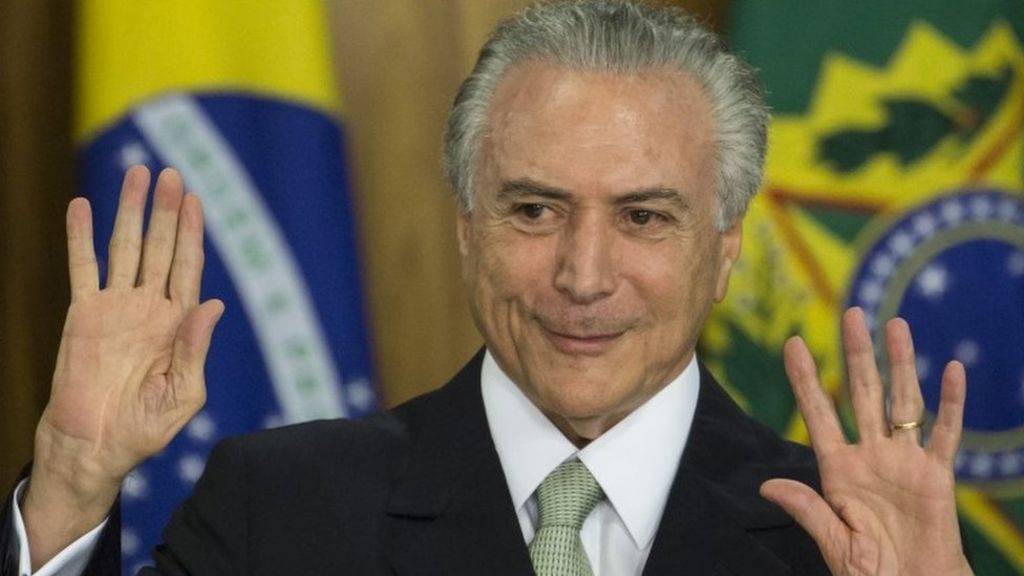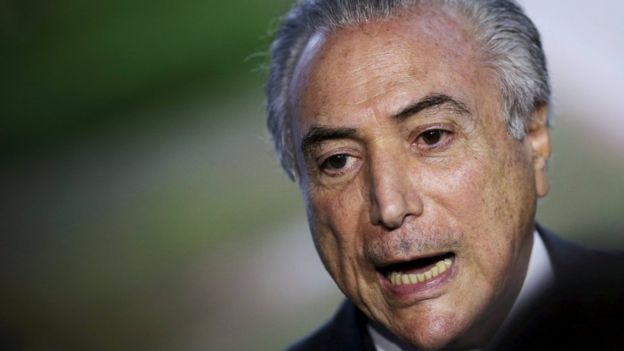Brazil impeachment: New leader Temer calls for trust

Brazil's new interim President Michel Temer has addressed the nation after the Senate voted to back the impeachment trial of Dilma Rousseff.
"Trust in the values of our people and in our ability to rebuild the economy," Mr Temer said.
He has named a business-friendly cabinet that includes respected former central bank chief Henrique Meirelles as finance minster.
Ms Rousseff denounced her removal as a "farce" and "sabotage".
Mr Temer was the leftist Ms Rousseff's vice-president before withdrawing his party's support in March. She has accused him of involvement in a "coup".
After Wednesday's all-night session that lasted more than 20 hours, senators voted by 55 votes to 22 to suspend her and put her on trial for budgetary violations.
In her final speech on Thursday afternoon, she again denied the allegations and vowed to fight what she called an "injustice" by all legal means.
Mr Temer, 75, has now taken over as president for up to 180 days — the maximum time allowed for the impeachment trial of Ms Rousseff, 68.
He said: "It is urgent to restore peace and unite Brazil. We must form a government that will save the nation."
Stressing that "economic vitality" was his key task, he added: "It is essential to rebuild the credibility of the country at home and abroad to attract new investments and get the economy growing again."
But he also said Brazil was still a poor nation and that he would protect and expand social programmes.
"Let's stop talking about crisis. Let's work instead," he said.
Who is stand-in President Michel Temer?
Michel Temer became interim president as soon as Ms Rousseff was suspended.
The 75-year-old law professor of Lebanese origin was Ms Rousseff's vice-president and was a key figure in the recent upheaval
Up until now, he's been the kingmaker, but never the king, having helped form coalitions with every president in the past two decades
He is president of Brazil's largest party, the PMDB, which abandoned the coalition in March
In recent months, his role has become even more influential; in a WhatsApp recording leaked in April, he outlined how Brazil needed a "government to save the country".
Michel Temer also said he would support the sweeping investigation into corruption at state oil company Petrobras that has embroiled many politicians and officials.
Mr Temer has nominated a 22-strong cabinet.
There are no women, although two more names are expected to be added to the cabinet. Ms Rousseff had earlier suggested that sexism in the male-dominated Congress had played a key part in the impeachment process.
Mr Meirelles, the new finance minister, built a reputation for calming nerves in the markets when heading the central bank, and helped tame inflation to create one of the country's biggest economic booms.
But analysts say Mr Temer's popularity ratings are as bad as Ms Rousseff's and he faces many challenges.
During the overnight debate, Senator Jose Serra, who has been named the new foreign minister, said the impeachment process was "a bitter though necessary medicine".
"Having the Rousseff government continue would be a bigger tragedy," he said.
Brazil is suffering from its worst recession in 10 years, unemployment reached 9% in 2015 and inflation is at a 12-year high.
'Fraudulent'
In her TV speech, flanked by ministers at the presidential palace, Ms Rousseff said that she may have made mistakes but had committed no crimes, adding: "I did not violate budgetary laws."
She said: "What is at stake is respect for the ballot box, the sovereign will of the Brazilian people and the constitution."
Branding the process "fraudulent" and saying her government was "undergoing sabotage", she vowed to fight the charges against her and said she was confident she would be found innocent.
Her removal ends 13 years of leftist rule.
What happens next?
The 180 days allocated for the trial to take place expire on 8 November.
Graphic showing the next steps in impeachment proceedings against Brazil president Dilma Rousseff
Политика конфиденциальности | Правила пользования сайтом








